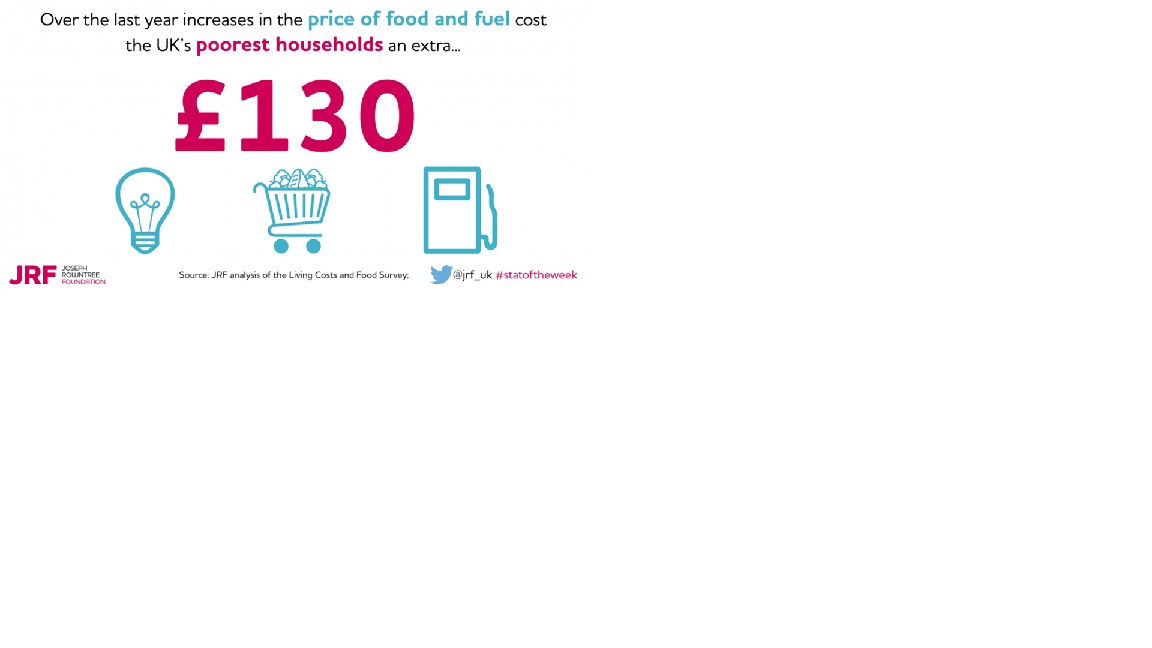Joseph Rowntree Foundation Says 2018 Will Be a Difficult Year
Thursday 11 January, 2018 Written by Simon Collyer
2018 is set to be a difficult year for low-income households, as average price inflation for the UK stands at its highest since April 2012. But it’s not just price inflation that’s hitting low-income families hard, says Laurie Heykoop.
For most of last year, price rises outpaced wages, especially in sectors such as retail and hospitality which employ many low-income workers. The financial pressure is even worse for low-income families receiving working-age benefits and tax credits, frozen since April 2016, and they are paying more in five key areas:
1 Paying more for public transport
Train price rises have received a great deal of media attention, but bus and coach transport are often more important for low-income households, especially outside London and the South East. The cost of bus and coach travel has increased by a huge 13.9% in the last year. Low-income households that regularly use buses will pay an average additional £116.15 per year for their fares in 2018. Transport costs or availability can have knock-on effects if they restrict people’s ability to reach better-value shops, jobs or services. Keeping bus travel affordable is vital to enable people on low incomes to buy low-price food, get and keep jobs and access health and other services.
2 Paying more for food and energy
In addition the cost of some essential goods and services has been rising even faster than average inflation. Energy bills have increased by 6.4% since last year, with electricity alone increasing by a massive 11.4%. Typical households in the bottom fifth of incomes will now be paying £61.86 more compared to last year for the same energy use. Food prices have also been rising faster than average, at 4.3% over the past year. It will cost an additional £67.81 per year for a family in the poorest fifth for the same weekly shop in 2018.
These price rises hit poorer households especially hard. Households in the bottom fifth of income spend twice as much of their income on food and fuel compared with households in the top fifth. Just to cover those food and energy basics, families will need to find an extra £130 this year.
Infographic showing the increases in the price of food and fuel costs to the UK's poorest households cost an extra £130 per year.
3 Paying the 'poverty premium'
But in addition to price rises, many low-income households end up paying more for basic goods and services than households on higher incomes (known as the ‘poverty premium’). Some low-income households pay their bills through pre-payment meters as a strategy to manage finances: they're worse value but offer more certainty over the ability to pay. Other coping strategies involve low-income parents cutting back on spending for themselves in order to prioritise money for their children’s needs.
4 Dealing with debt
Rising prices and stagnating incomes combine to place unsustainable pressure on family finances. For those already struggling to get by it can lead to falling behind with bills or building up debt. A fifth of low-income households experience ‘problem debt’. Our research on destitution found that most people experiencing destitution had been behind on bills within the year, most frequently cited were rent or council tax, followed by energy and water.
5 The benefit freeze
In April the Government’s freeze on working-age benefits and tax credits will enter its third year. In 2018, a couple with children claiming Universal Credit will be up to £500 worse off, and a lone parent with children will be up to £400 worse off, due to the benefit freeze. In 2020/21, nearly 400,000 more people are likely to be in poverty due to the benefit freeze, the vast majority in working households. After a disappointing lack of action in 2017, the Spring Budget brings another opportunity to ease the pressure on low-income families by ending the freeze.

Leave a comment
Make sure you enter all the required information, indicated by an asterisk (*). HTML code is not allowed.
Join
FREE
Here










